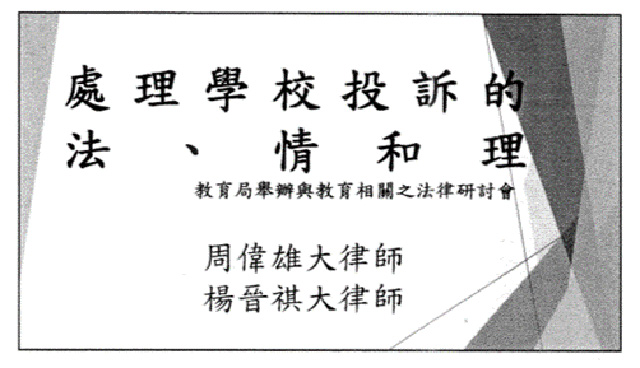Handling School Complaints from a Legal, Empathetic, and Rational Perspective
Suggested learning time: approximately 1 hour
The presentation slides aim to assist schools in understanding their responsibilities and preventive measures in handling complaints from a legal, empathetic, and rational perspective. The content includes points to note in handling complaints, methods of dispute resolution, the application of the "Apology Ordinance", and important considerations for schools when dealing with complaints
Disclaimer
Viewpoints in the presentation slides are purely shared by the speaker in his/her capacity. They are for reference only and should not be construed as legal advice or recommendation, which schools should obtain in each particular case if necessary.
(1) Presentation slides
Handling School Complaints: School Liabilities and Preventive Measures and the Law and Factors Outside Legal Considerations
(Chinese version only)
[27 pages]
Questions
1. What are the most common sources of school complaints? How can schools deal with such complaints?
Please refer to pages 3 and 11 of the presentation slides “Handling School Complaints: School Liabilities and Preventive Measures and the Law and Factors Outside Legal Considerations”.
2. How should schools handle complaints of different nature?
Please refer to pages 6 - 8 of the presentation slides “Handling School Complaints: School Liabilities and Preventive Measures and the Law and Factors Outside Legal Considerations”.
3. Will an apology be considered an admission of fault or legal liability?
Please refer to page 16 of the presentation slides “Handling School Complaints: School Liabilities and Preventive Measures and the Law and Factors Outside Legal Considerations”.
4. How can schools reduce the chance of complaints?
Effective School-based Mechanism: To ensure that public enquiries/complaints are properly handled, schools should establish a school-based mechanism to suit their own circumstances and the needs of stakeholders. It should be:
- Clear and unambiguous
- Open and transparent
- Concise and easy to follow
- Fair and just
- Able to protect confidentiality of information
- Under continuous review and improvement
Maintaining good communication: In addition to formulating an effective complaint handling mechanism, schools should continue to maintain a close partnership with parents and staff by enhancing communication with them. Executive members of the Parent-Teacher Association of the school can serve as a bridge of communication by helping to explain the school policies to parents, relieving their sentiments of dissatisfaction, and playing the role of mediator when necessary. To enhance the standards of the professional services they provide, schools should always assume an open attitude and listen to the views of their sponsoring bodies and stakeholders to identify room for improvement regarding their school-based enquiry/complaint handling mechanism(s) and procedures.
Suggested Follow-up Activities
Please read section 4.4 of the School Administration Guide [4 pages].
SMC Chairperson and SMC members may study appropriate cases in the presentation slides “Preventing and Resolving School Complaints by Active Listening and Reframing” (Chinese only) [23 pages] (P.3-7, 10-13 and 16-21) before SMC meeting and reserve 20-30 minutes in the meeting to share and discuss the ways in handling the complaints or conflicts of the cases. After the discussion, please use the presentation slides (P.8-9, 14-15 and 22) for debriefing.
Additional Reference Materials
- Education Bureau - Brief on the Enhanced School Complaint Management Arrangements
- Education Bureau - Enhanced School Complaint Management Arrangements - Points to Note in Handling School Complaints
- Education Bureau - Reference materials on mediation CHI

